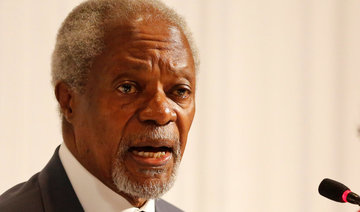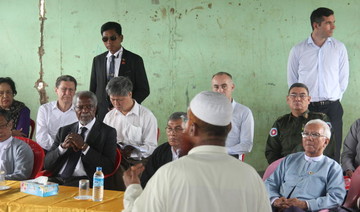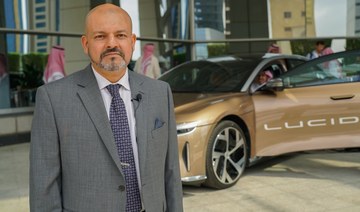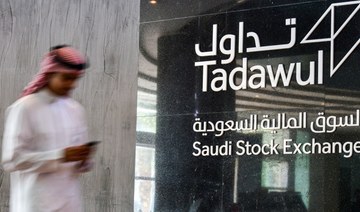GENEVA: Kofi Annan, one of the world’s most celebrated diplomats and a charismatic symbol of the United Nations who rose through its ranks to become the first black African secretary-general, has died. He was 80.
His foundation announced his death in Switzerland on Saturday in a tweet , saying that he died after a short unspecified illness.
“Wherever there was suffering or need, he reached out and touched many people with his deep compassion and empathy,” the foundation said in a statement.
Annan spent virtually his entire career as an administrator in the United Nations. His aristocratic style, cool-tempered elegance and political savvy helped guide his ascent to become its seventh secretary-general, and the first hired from within. He served two terms from Jan. 1, 1997, to Dec. 31, 2006, capped nearly mid-way when he and the UN were jointly awarded the Nobel Peace Prize in 2001.
During his tenure, Annan presided over some of the worst failures and scandals at the world body, one of its most turbulent periods since its founding in 1945. Challenges from the outset forced him to spend much of his time struggling to restore its tarnished reputation.
His enduring moral prestige remained largely undented, however, both through charisma and by virtue of having negotiated with most of the powers in the world.
When he departed from the United Nations, he left behind a global organization far more aggressively engaged in peacekeeping and fighting poverty, setting the framework for the UN’s 21st-century response to mass atrocities and its emphasis on human rights and development.
“Kofi Annan was a guiding force for good,” current UN Secretary-General Antonio Guterres said. “It is with profound sadness that I learned of his passing. In many ways, Kofi Annan was the United Nations. He rose through the ranks to lead the organization into the new millennium with matchless dignity and determination.”
Even out of office, Annan never completely left the UN orbit. He returned in special roles, including as the UN-Arab League’s special envoy to Syria in 2012. He remained a powerful advocate for global causes through his eponymous foundation.
Annan took on the top UN post six years after the collapse of the Soviet Union and presided during a decade when the world united against terrorism after the Sept. 11 attacks — then divided deeply over the US-led war against Iraq. The US relationship tested him as a world diplomatic leader.
“I think that my darkest moment was the Iraq war, and the fact that we could not stop it,” Annan said in a February 2013 interview with TIME magazine to mark the publication of his memoir, “Interventions: A Life in War and Peace.”
“I worked very hard — I was working the phone, talking to leaders around the world. The US did not have the support in the Security Council,” Annan recalled in the videotaped interview posted on The Kofi Annan Foundation’s website.
“So they decided to go without the council. But I think the council was right in not sanctioning the war,” he said. “Could you imagine if the UN had endorsed the war in Iraq, what our reputation would be like? Although at that point, President (George W.) Bush said the UN was headed toward irrelevance, because we had not supported the war. But now we know better.”
Despite his well-honed diplomatic skills, Annan was never afraid to speak candidly. That didn’t always win him fans, particularly in the case of Bush’s administration, with whom Annan’s camp spent much time bickering. Much of his second term was spent at odds with the United States, the UN’s biggest contributor, as he tried to lean on the nation to pay almost $2 billion in arrears.
Kofi Atta Annan was born April 8, 1938, into an elite family in Kumasi, Ghana, the son of a provincial governor and grandson of two tribal chiefs.
He shared his middle name Atta — “twin” in Ghana’s Akan language — with a twin sister, Efua. He became fluent in English, French and several African languages, attending an elite boarding school and the University of Science and Technology in Kumasi. He finished his undergraduate work in economics at Macalester College in St. Paul, Minnesota, in 1961. From there he went to Geneva, where he began his graduate studies in international affairs and launched his UN career.
Annan married Titi Alakija, a Nigerian woman, in 1965, and they had a daughter, Ama, and a son, Kojo. He returned to the US in 1971 and earned a master’s degree at the Massachusetts Institute of Technology’s Sloan School of Management. The couple separated during the 1970s and, while working in Geneva, Annan met his second wife, Swedish lawyer Nane Lagergren. They married in 1984.
Annan worked for the UN Economic Commission for Africa in Ethiopia, its Emergency Force in Egypt, and the office of the High Commissioner for Refugees in Geneva, before taking a series of senior posts at UN headquarters in New York dealing with human resources, budget, finance, and staff security.
He also had special assignments. After Iraq invaded Kuwait in 1990, he facilitated the repatriation from Iraq of more than 900 international staff and other non-Iraqi nationals, and the release of western hostages in Iraq. He led the initial negotiations with Iraq for the sale of oil in exchange for humanitarian relief.
Just before becoming secretary-general, Annan served as UN peacekeeping chief and as special envoy to the former Yugoslavia, where he oversaw a transition in Bosnia from UN protective forces to NATO-led troops.
The UN peacekeeping operation faced two of its greatest failures during his tenure: the Rwanda genocide in 1994, and the massacre in the Bosnian town of Srebrenica in July 1995.
In both cases, the UN had deployed troops under Annan’s command, but they failed to save the lives of the civilians they were mandated to protect. Annan offered apologies, but ignored calls to resign by US Republican lawmakers. After became secretary-general, he called for UN reports on those two debacles — and they were highly critical of his management.
As secretary-general, Annan forged his experiences into a doctrine called the “Responsibility to Protect,” that countries accepted — at least in principle — to head off genocide, crimes against humanity, ethnic cleansing and war crimes.
Annan sought to strengthen the UN’s management, coherence and accountability, efforts that required huge investments in training and technology, a new whistleblower policy and financial disclosure requirements.
In 1998, he helped ease a transition to civilian rule in Nigeria and visited Iraq to try to resolve its impasse with the Security Council over compliance with weapons inspections and other matters. The effort helped avoid an outbreak of hostilities that seemed imminent at the time.
In 1999, he was deeply involved in the process by which East Timor gained independence from Indonesia, and started the “Global Compact” initiative that has grown into the world’s largest effort to promote corporate social responsibility.
Annan was chief architect of what became known as the Millennium Development Goals, and played a central role in creating the Global Fund to Fight AIDS, Tuberculosis and Malaria and the UN’s first counter-terrorism strategy.
Annan’s uncontested election to a second term was unprecedented, reflecting the overwhelming support he enjoyed from both rich and poor countries. Timothy Wirth, president of the United Nations Foundation, which disburses Ted Turner’s $1 billion pledge to UN causes, hailed “a saint-like sense about him.”
In 2005, Annan succeeded in establishing the Peacebuilding Commission and the Human Rights Council. But that year, the UN was facing almost daily attacks over allegations about corruption in the UN oil-for-food program in Iraq, bribery by UN purchasing officials and widespread sex abuse by UN peacekeepers — an issue that would only balloon in importance after he left office.
It emerged that Annan’s son, Kojo, had not disclosed payments he received from his employer, which had a $10 million-a-year contract to monitor humanitarian aid under the oil-for-food program. The company paid at least $300,000 to Kojo so he would not work for competitors after he left.
An independent report criticized the secretary-general for being too complacent, saying he should have done more to investigate matters even if he was not involved with the awarding of the contract.
World leaders agreed to create an internal UN ethics office, but a major overhaul of the UN’s outdated management practices and operating procedures was left to Annan’s successor, Ban Ki-moon.
Before leaving office, Annan helped secure a truce between Israel and Hezbollah in 2006, and mediated a settlement of a dispute between Cameroon and Nigeria over the Bakassi peninsula.
At a farewell news conference, Annan listed as top achievements the promotion of human rights, the fighting to close the gap between extreme poverty and immense wealth, and the UN campaign to fight infectious diseases like AIDS.
He never took disappointments and setbacks personally. And he kept his view that diplomacy should take place in private and not in the public forum.
In his memoir, Annan recognized the costs of taking on the world’s top diplomatic job, joking that “SG,” for secretary-general, also signified “scapegoat” around UN headquarters.
Former US ambassador to the United Nations Richard Holbrooke called Annan “an international rock star of diplomacy.”
After leaving his high-profile UN perch, Annan didn’t let up. In 2007, his Geneva-based foundation was created. That year he helped broker peace in Kenya, where election violence had killed over 1,000 people.
He also joined “The Elders,” an elite group of former leaders founded by Nelson Mandela, eventually succeeding Desmond Tutu as its chairman after a failed interlude trying to resolve Syria’s rising civil war.
As special envoy to Syria in 2012, Annan won international backing for a six-point plan for peace. The UN deployed a 300-member observer force to monitor a cease-fire, but peace never took hold and Annan was unable to surmount the bitter stalemate among Security Council powers. He resigned in frustration seven months into the job, as the civil war raged on.
Annan continued to crisscross the globe. In 2017, his foundation’s biggest projects included promotion of fair, peaceful elections; work with Myanmar’s government to improve life in troubled Rakhine state; and battling violent extremism by enlisting young people to help.
He also remained a vocal commentator on troubles like the refugee crisis; promoted good governance, anti-corruption measures and sustainable agriculture in Africa; and pushed efforts in the fight against illegal drug trafficking.
Annan retained connections to many international organizations. He was chancellor of the University of Ghana, a fellow at New York’s Columbia University, and professor at the Lee Kuan Yew School of Public Policy in Singapore.
In his memoir, Annan recognized the costs of taking on the world’s top diplomatic job, joking that “SG,” for secretary-general, also signified “scapegoat” around UN headquarters.
Annan is survived by his wife and three children. Funeral arrangement weren’t immediately announced.
Former UN chief and Nobel Peace Prize Laureate Kofi Annan has died
Former UN chief and Nobel Peace Prize Laureate Kofi Annan has died
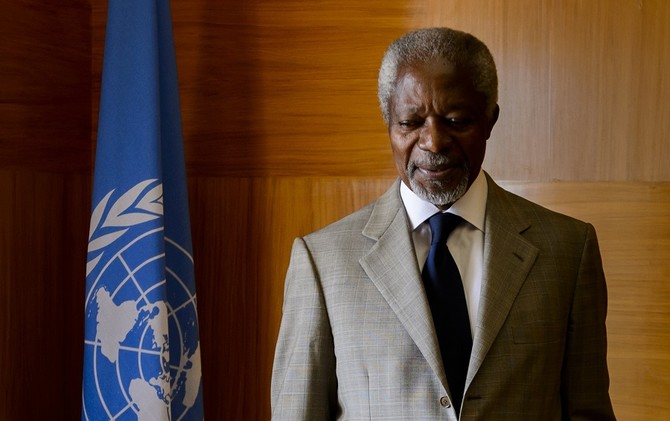
- His family said he died after a short unspecified illness
- During his tenure, Annan presided over some of the worst failures and scandals at the world body
Al-Falih meets Chilean ministers to explore investment opportunities
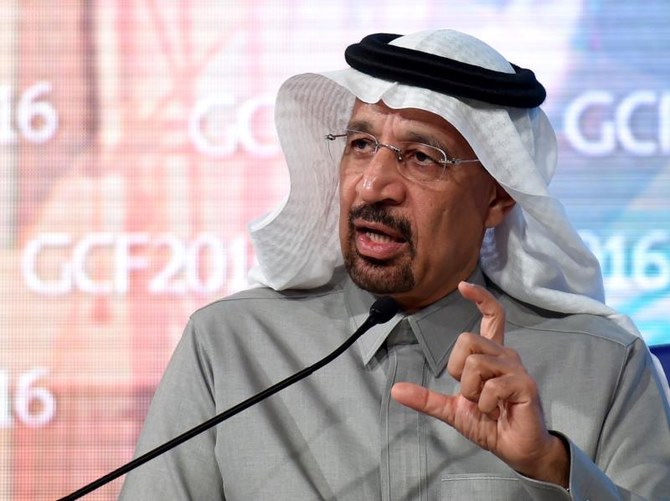
RIYADH: Investment opportunities between Saudi Arabia and Chile are set to get a boost as officials from both sides convened for a roundtable meeting in Santiago on Saturday.
Saudi Minister of Investment Khalid Al-Falih engaged in substantive dialogue with various Chilean ministers and government officials to explore and amplify mutual financing possibilities.
The meeting underscored the necessity of cementing economic ties between the Kingdom and Chile in bolstering the private sectors of both countries and fostering partnerships in areas of shared interest.
Al-Falih met with Chilean Foreign Minister Alberto van Klaveran, Minister of Economy, Development and Tourism Nicolas Grau and Minister of Public Works Jessica Lopez Saffie.
The meetings are part of the Saudi Ministry of Investment and its delegation’s intention to promote bilateral trade by introducing the Kingdom’s public and private sectors to Latin American countries to explore investment opportunities.
Al-Falih also signed a memorandum of understanding with Argentina’s Ministry of Foreign Affairs, International Trade and Worship on Saturday.
The agreement aims to boost cooperation between both parties to facilitate direct investments.
Furthermore, Al-Falih discussed several topics with Argentina’s minister around enhancing partnerships and collaborative investments in quality projects.
On Thursday, Al-Falih led a 60-member delegation to an investment forum in Uruguay’s capital Montevideo.
These initiatives are in line with the aim of the Saudi Ministry of Investment to attract quality investments that will empower sector growth, develop policies and improve the overall access to services through partnerships between the public and private sectors.
The ministry also endeavors to bolster collaborative initiatives with the private sector to drive social and economic transformation within the Kingdom under the strategic framework of Vision 2030.
It underscored its role as a facilitator and catalyst by enabling the involvement of both domestic and international private sectors to fuel economic growth.
Additionally, it emphasized its commitment to assisting these sectors in navigating and surmounting any challenges they may encounter in their interactions with pertinent bodies, both locally and globally.
Yorkshire cricket club punished over racism scandal

- Pakistan-born bowler Rafiq went public with allegations of racism and bullying in September 2020
- The points penalty sends Yorkshire to the bottom of Division Two of the County Championship
LONDON: Yorkshire County Cricket Club were slapped with a huge 48-point deduction in the English County Championship on Friday after admitting four charges related to the Azeem Rafiq racism scandal.
The independent Cricket Discipline Commission (CDC) also fined the club £400,000 ($514,000), £300,000 of which is suspended for two years.
The points penalty sends Yorkshire to the bottom of Division Two of the County Championship.
Pakistan-born bowler Rafiq, 32, went public with allegations of racism and bullying in September 2020, related to his two spells at the English county.
The Yorkshire board issued a statement accepting the sanctions.
“The CDC and ECB (England and Wales Cricket Board) have today acknowledged the vast amount of work done by YCCC to overcome the cultural issues that existed within the club, which allowed racist and discriminatory behavior to go unchallenged,” it said.
“We are accountable for these issues, and we accepted four amended charges as part of a continued commitment to ensure we are able to move forward.”
But the Yorkshire board added: “We are disappointed to receive the point deductions which affects players and staff at the club, who were not responsible for the situation.”
ECB chief executive Richard Gould, who was not in post during the Rafiq scandal, said: “There can be no place for racism in our game, and the penalties announced by the Cricket Discipline Commission mark the end of a thorough disciplinary process.
“No one should have to experience what Azeem Rafiq went through in cricket, and we once again thank him for his courage in speaking out.”
Six former Yorkshire players were previously fined by the CDC after being found guilty of using racist language.
Separately, a damning report by the Independent Commission for Equity in Cricket (ICEC) last month revealed “widespread” racism, sexism and classism in English cricket.
The ICEC was established in 2021 following the racism scandal surrounding the treatment of Rafiq.
Electric car sales to grow by 35% to hit 14m in 2023 amid sustainability push: IEA

RIYADH: The sale of electric cars is expected to increase by 35 percent in 2023 to hit 14 million, up from the 10 million sold in 2022, as the world continues its drive toward a sustainable future, according to a report released by the International Energy Association.
In its Global EV Outlook 2023 report, the IEA noted the share of electric cars in the overall car market has risen from around 4 percent in 2020 to 14 percent in 2022 and is set to increase to 18 percent this year.
The IEA further noted this rapid electrification of transport vehicles will eliminate the need for five million barrels of oil per day by the end of the decade.
“Electric vehicles are one of the driving forces in the new global energy economy that is rapidly emerging — and they are bringing about a historic transformation of the car manufacturing industry worldwide,” said the IEA’s Executive Director Fatih Birol.
He added: “Cars are just the first wave: electric buses and trucks will follow soon.”
According to the IEA, the majority of electric car sales to date are mainly concentrated in three markets: China, Europe and the US.
The IEA further noted that China accounted for 60 percent of global electric car sales in 2022.
Europe and the US, the second and third largest markets, also saw strong growth with sales increasing by 15 percent and 55 percent respectively in 2022.
Apart from the US, Europe and China, electric car sales in countries like India and Indonesia tripled in 2022, while sales figures doubled in Thailand.
The IEA added that in emerging and developing economies, two- or three-wheeler vehicles outnumber cars. The report pointed out that over half of India’s three-wheeler registrations in 2022 were electric.
“In many developing economies, two- or three-wheelers offer an affordable way to get access to mobility, meaning their electrification is important to support sustainable development,” the report added.
Saudi stocks in red as Saudi inflation hits high: Closing bell

RIYADH: Saudi Arabia’s main index, TASI, ended the first session of the week in the red, with investors remaining concerned about high inflation in the country.
The Tadawul All Share Index dipped 0.14 percent to end at 11,405, while the parallel market, Nomu, dropped 0.13 percent to finish at 19,744.
Saudi oil giant Aramco ended the session 1.13 percent lower, while Rabigh Refining and Petrochemical Co. edged down 0.14 percent.
Saudi National Bank, the Kingdom’s largest lender, ended the session flat, while Saudi British Bank increased by 1.64 percent.
The Kingdom’s most valued bank, Al Rajhi, gained 0.49 percent, while Alinma Bank was up 0.84 percent.
Zain KSA rose 2.09 percent, following the sale of its subsidiary to the Public Investment Fund for the nominal amount of SR10,000 ($2,666).
Saudi Co. for Hardware, known as SACO, edged up 0.60 percent, having appointed Abdel-Salam Bdeir as CEO after Haytham Alhamidi resigned.
Scientific and Medical Equipment House Co. gained 4.76 percent to lead the gainers, while Salama Cooperative Insurance Co. fell 6.19 percent to lead the fallers since last week.
Louvre Abu Dhabi releases sci-fi podcast featuring 7 international celebrities

DUBAI: On Sunday, Louvre Abu Dhabi has released a 20-minute cinematic podcast, “We Are Not Alone,” that reinterprets the museum's architecture through a futuristic story narrated by seven international celebrities.
Available in six different languages, the new podcast is narrated in the voices of Emirati singer Hussain Al-Jassmi in Arabic, American actor Willem Dafoe in English, French actress and singer Charlotte Gainsbourg in French and English, Chinese actress Zhou Dongyu in Mandarin, Russian DJ and singer Nina Kraviz in Russian and filmmaker and playwright Wim Wenders in German.
“Louvre Abu Dhabi tells the story of art history throughout the ages,” said Manuel Rabate, Director of Louvre Abu Dhabi in a statement. “As we always look for new ways to experiment and innovate, we continue to explore new narratives inspired by our architecture and collection. ‘We Are Not Alone’ is yet another example of our innovative approach to sharing stories of cultural connections,” he added.
The new podcast is composed and produced by Soundwalk Collective, an experimental group of artists and musicians. It is a part of the UAE museum’s extensive digital offering, which includes free access to content through virtual tours, video, audio and downloadable activities.



